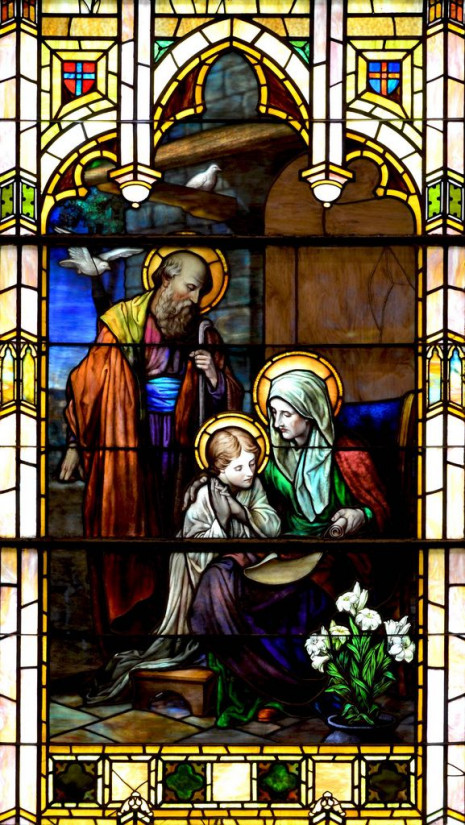- Education
- Becoming Catholic
- Alpha
- Bible Studies
-
The Saints
- St. Andrew
- St. Francis Xavier
- St. Lucy
- St. John of the Cross
- St. Andre Bessette
- St. Agnes
- St. Francis de Sales
- St. John Bosco
- St. Valentine
- St. Scholastica
- St. Polycarp
- Sts. Perpetua & Felicity
- St. Patrick
- St. Joseph
- St. Faustina
- St. Kateri Tekakwitha
- St. Catherine of Sienna
- St. Athanasius
- St. Dymphna
- St. Margaret Mary Alacoque
- St. Cyril of Jerusalem
- St. Marguerite d'Youville
- Sts. Peter & Paul, Apostles
- St. Benedict
- St. Bridget of Sweden
- Sts. Joachim & Anne
- St. Martha
- St. Dominic of the Rosary
- St. Anthony of Padua
- St. Augustine of Hippo
- St. Thomas Aquinas
- St. John Chrystostom
- St. Elizabeth Ann Seton
- St. Vincent de Paul
- Sts. Michael, Gabriel & Raphael, the archangels
- St. Francis of Assisi
- St. Teresa of Avila
- St. Luke
- St. Jude
- St. Gertrude the Great
- St. Martin de Porres
- St. Elizabeth of Hungary
- St. Cecilia

Sts. Joachim & Anne
Feast day: July 26 Patron: of Grandparents, Anne - of Christian mothers and of women in labor
By tradition Joachim and Anne are considered to be the names of the parents of Mary, the Mother of God. We have no historical evidence, however, of any elements of their lives, including their names. Any stories about Mary's father and mother come to us through legend and tradition.
We get the oldest story from a 2nd-century document called the Protevangelium of James (“First Gospel of James”) and the 3rd-century Evangelium de nativitate Mariae (“Gospel of the Nativity of Mary”).
According to these noncanonical sources, Anne was born in Bethlehem in Judaea. She married Joachim, and, although they shared a wealthy and devout life at Nazareth, they eventually lamented their childlessness. Joachim, reproached at the Temple for his sterility, retreated into the countryside to pray, while Anne, grieved by his disappearance and by her barrenness, solemnly promised God that, if given a child, she would dedicate it to the Lord’s service. Both received the vision of an angel, who announced that Anne would conceive and bear a most wondrous child. The couple rejoiced at the birth of their daughter, whom Anne named Mary. When the child was three years old, Joachim and Anne, in fulfillment of her divine promise, brought Mary to the Temple of Jerusalem, where they left her to be brought up.
The account of their lives startlingly parallels the Old Testament story of the barren Hannah and her conception of Samuel (1 Samuel 1); she also dedicated her child to the service of God.
According to later legends, Joachim died shortly after Mary’s birth, and Anne, encouraged by the Holy Spirit, remarried. Some traditions hold that Anne in her alleged subsequent marriage(s) became the grandmother of the Apostles John and James (sons of Zebedee), Simon, Jude, and James the Less (son of Alphaeus) and also of James, “the Lord’s brother.” Eastern literature on Anne, going back to the 4th century, does not follow the fantastic legends of medieval Western tradition.
Anne’s cult was fervent in the Eastern church as early as the 4th century, and many churches, the first dating from the 6th century, were built in her honour. In the early 8th century Pope Constantine probably introduced her devotion to Rome, while Joachim’s cult was introduced in the West in the 15th century. Anne became extremely popular in the Middle Ages and influenced such theologians as Jean de Gerson, Konrad Wimpinar, and Johann Eck. In response to attacks on her cult by Protestant reformers, devotion to St. Anne was further promoted by post-Reformation popes.
The Protevangelium became the foundation for establishing the liturgical feasts of the Nativity of the Virgin Mary (September 8) and the Immaculate Conception of the Blessed Virgin Mary (December 8). The dedication of Mary at the Temple became so important in church doctrine that by 1585 Pope Sixtus V included in the Western church calendar the liturgical feast of the Presentation of the Virgin Mary (November 21). Although this festival originated early in the East, probably at Jerusalem in 543, its first Western observance was recorded in England in the 11th century.
For those who wonder what we can learn from people we know nothing about for sure and how we can honor them, we must focus on why they are honored by the church. Whatever their names or the facts of their lives, the truth is that it was the parents of Mary who nurtured Mary, taught her, & brought her up to be a worthy Mother of God. It was their teaching that led her to respond to God's request with faith, "Let it be done to me as you will." It was their example of parenting that Mary must have followed as she brought up her own son, Jesus. It was their faith that laid the foundation of courage and strength that allowed her to stand by the cross as her son was crucified and still believe. Such parents can be examples and models for all parents.
| Mon | No Mass |
| Tue | 9:30am |
| Wed | No Mass |
| Thu | No Mass |
| Fri | No Mass |
| Sat | No Mass |
| Sun | 11:00am |